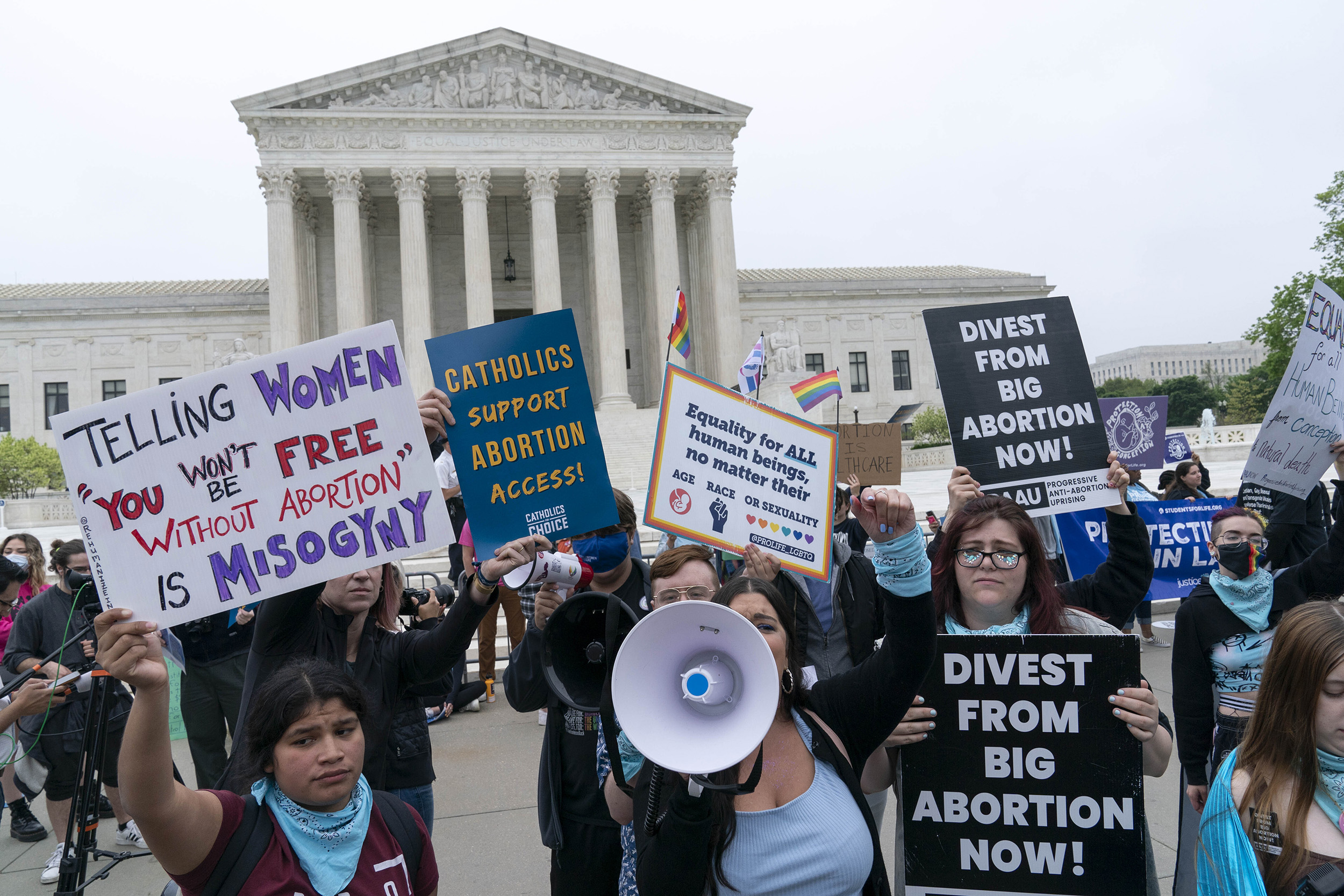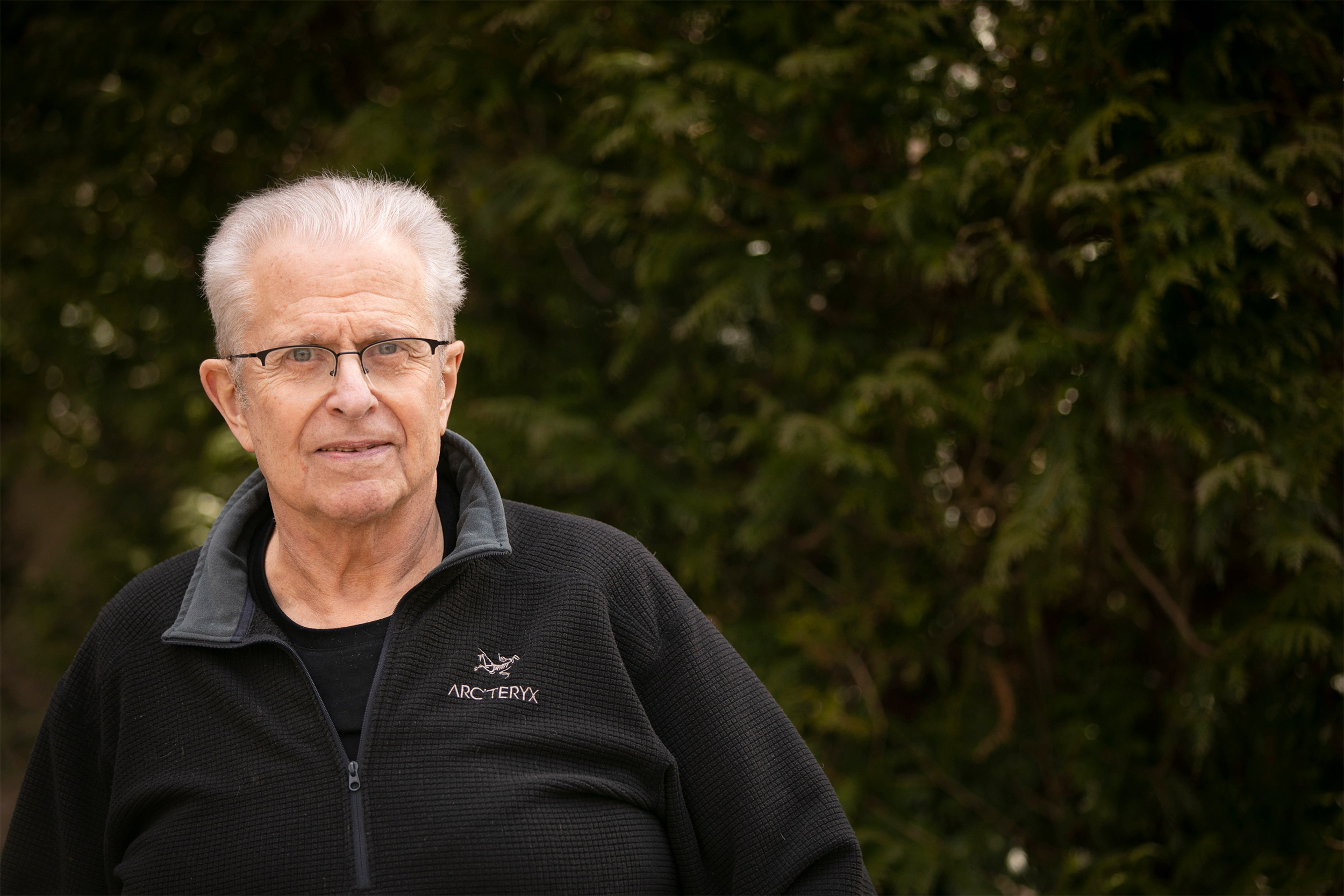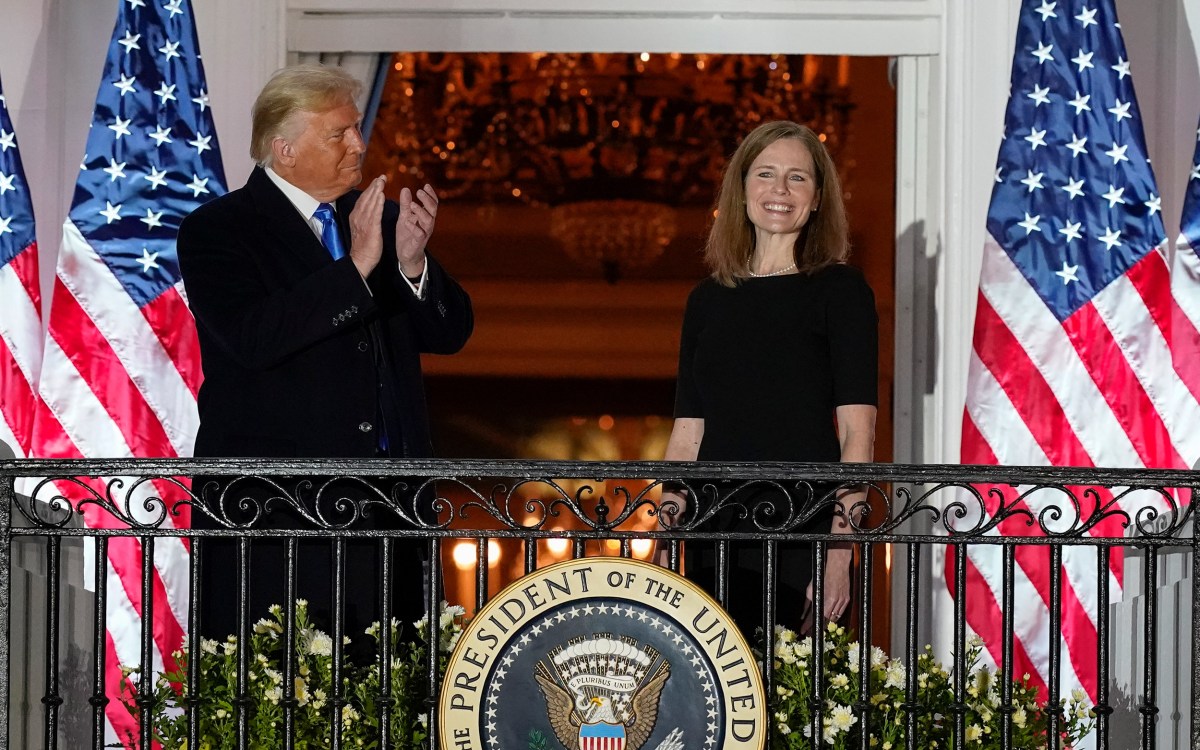
Pro- and anti-abortion rights activists demonstrate outside the Supreme Court following leak of draft majority opinion reversing Roe v. Wade.
AP Photo/Jose Luis Magana
Softer language post-leak? Maybe, says Tribe, but ruling will remain an ‘iron fist’
Scholar of constitutional law discusses immediate, future implications of breach revealing SCOTUS decision that would overturn Roe
Editor’s note: On Friday, the Supreme Court eliminated the constitutional right to abortion in a ruling overturning Roe v. Wade, which was decided almost 50 years ago. In May, after an early version of the decision was leaked to the press, the constitutional law scholar Laurence Tribe reacted to Justice Samuel Alito’s majority opinion in an interview with the Gazette.
The leak of a draft majority opinion reversing Roe v. Wade, the landmark 1973 Supreme Court ruling legalizing abortion, was an unprecedented breach in a process typically shrouded in secrecy and a blow to the nation’s highest court, which in recent years has been plagued by questions about its impartiality from both the left and the right. In a statement released Tuesday, Chief Justice John Roberts confirmed the authenticity of the draft, written by Justice Samuel Alito, but insisted that it was not final. He called the leak a “singular and egregious breach” and said that he has directed the marshal of the court to investigate its source.
The Gazette spoke with Laurence H. Tribe, the Carl M. Loeb University Professor and Professor of Constitutional Law, Emeritus, at Harvard Law School, about the leak, how it might have happened, and what it could mean for the court’s reputation and the outcome of the case. The interview was edited for clarity and length.
Q&A
Laurence H. Tribe
GAZETTE: How many people have access to a draft like this, and how could it have been leaked to the press?
TRIBE: It could easily be leaked by any of the justices or by any of their law clerks because all of the clerks in all nine chambers would have seen the draft that was circulated by Justice Alito on Feb. 10. There are plenty of people who were capable of leaking it. But this is obviously an unprecedented thing, and that makes it much harder for the court to operate effectively if confidentiality is compromised, which is why I was not at all surprised to see the Chief Justice announce an internal investigation to see where the leak came from. I really have no speculation as to whether it is more likely to have come from the chambers of one of the justices who, at least initially, were with Justice Alito in deciding to uphold the Mississippi law and also to overrule all of the abortion jurisprudence that dated to 1973 and perhaps some of the decisions on which Roe v. Wade depended. Whether it came from one of those chambers, or more likely one of the liberal chambers, you could come up with any number of possible motivations for the leak.
GAZETTE: Justice Roberts says that the leak will not undermine the integrity of the court, but it seems like the public confidence may be permanently damaged by this kind of breach.
TRIBE: It seems to me it’s more damaged by the obviously partisan divisions within the court than by the court’s ham-handed attempts to persuade people that the political and ideological orientation of justices on the right or on the left somehow has nothing to do with the way they view legal issues. That pretense — by Justice Stephen Breyer in his book and by Justice Amy Coney Barrett and some of the other justices on the speaking circuit — I think itself undermines the court’s legitimacy, because it so obviously displays a lack of candor on the part of the justices. The legitimacy of the court ever since Bush v. Gore has been teetering in various ways, and I think the leak itself just reaffirms people’s view that the court is subject to lots of infighting and maneuvering.
“The bottom line almost never changes after the initial vote,” constitutional scholar Laurence Tribe said. “So rarely, in fact, that one wonders whether the court engages in enough internal deliberation.”
File photo by Stephanie Mitchell/Harvard Staff Photographer

GAZETTE: Do you think that this incident will revive the debate about court reform?
TRIBE: I would hope so, but I don’t think so. I think those of us on the President’s Commission who favored expanding the court realized that the politics of it just makes that extremely difficult. Certainly, people who are upset not so much by the leak, but by what was leaked, by the dramatic body blow to the fundamental rights that people have taken for granted for half a century or longer — I think that is going to increase some discussion of what, if anything, can be done, short of expanding the court. And the answer is very little — perhaps nothing. But I don’t think the leak itself is going to increase pressure to reform the court.
GAZETTE: You tweeted: “Because Roberts wouldn’t join an opinion this vicious in tone even if he joins in the result, any of the 4 joining Alito has the leverage to demand changes in the language. Leaking this maximally harsh version as a trial balloon would magnify that leverage.” Can you say more about what the final version might look like and how that language might change?
TRIBE: I suspect some of the language, which essentially makes fun of the Blackmun opinion in Roe v. Wade and which is unsparing in its sort of savage attack on the opinion, would be softened in some ways, perhaps to satisfy Brett Kavanaugh or Barrett. I doubt that it can be softened enough to satisfy Roberts. I suspect he will write separately, but who knows? But I think it’s important for people to recognize that the thrust of the decision and the dramatic and radical approach it takes to interpreting the Constitution’s unenumerated rights, narrowly and stingily, will not depend on the tone. That is, the opinion, whether it’s delivered in a velvet glove or not, is going to be an iron fist. The court is really announcing that it’s laying down the gauntlet with respect to rights like those recognized in Lawrence v. Texas, in terms of sexual intimacy, and Obergefell v. Hodges, in terms of the right to marry.
GAZETTE: Do you think the court should accelerate the release of the ruling? It seems like this leak could put some of the justices in a bit of a bind, making it hard for them to potentially change their mind.
TRIBE: I don’t really think so. I can’t imagine any justice changing his or her ultimate vote after the argument in the case, in which it was very clear where they were heading. I don’t think the leak will affect that. I think it’s conceivable that it will have some impact on the language here or there. But I don’t think it will do anything that would suggest a reason to accelerate the release of the decision. If anything, releasing the decision earlier than at the very end of the term, when everyone will have had as much time as possible to refine the paragraphs that he or she would have wanted to change, would give all the more power to leakers in the future. If the thought is that by leaking a decision you can affect the timing of its release, then there will be more leaks, and the court will be more injured in terms of its capacity to operate under conditions of confidentiality, which are really important for internal deliberations. So I would think they will not accelerate the release, and I think they shouldn’t.
GAZETTE: How common it is for a justice to change their mind or switch their point of view after such a lengthy draft like this is written?
TRIBE: It’s very uncommon for justices to move from the position of affirming a decision below to reversing. I’ve followed this pretty carefully through the court’s history, and the bottom line almost never changes after the initial vote — so rarely, in fact, that one wonders whether the court engages in enough internal deliberation. Language changes a lot. People can say, “Well, the more I think about it, the more trouble I have with this paragraph or with that example, and I would like you to add a reference to this or that case” — that sort of thing. But in terms of the ultimate decision about affirming or reversing, it’s very rare that that changes after the court votes following the oral argument.







